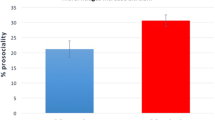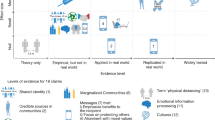Abstract
Government agencies around the world have begun to embrace the use of behavioural policy interventions (such as the strategic use of default options), which has inspired vigorous public discussion about the ethics of their use. Since any feasible policy requires some measure of public support, understanding when people find behavioural policy interventions acceptable is critical. We present experimental evidence for a ‘partisan nudge bias’ in both US adults and practising policymakers. Across a range of policy settings, people find the general use of behavioural interventions more ethical when illustrated by examples that accord with their politics, but view those same interventions as more unethical when illustrated by examples at odds with their politics. Importantly, these differences disappear when behavioural interventions are stripped of partisan cues, suggesting that acceptance of such policy tools is not an inherently partisan issue. Our results suggest that opposition to (or support for) behavioural policy interventions should not always be taken at face value, as people appear to conflate their attitudes about general purpose policy methods with their attitudes about specific policy objectives or policy sponsors.
This is a preview of subscription content, access via your institution
Access options
Access Nature and 54 other Nature Portfolio journals
Get Nature+, our best-value online-access subscription
$29.99 / 30 days
cancel any time
Subscribe to this journal
Receive 12 digital issues and online access to articles
$119.00 per year
only $9.92 per issue
Buy this article
- Purchase on Springer Link
- Instant access to full article PDF
Prices may be subject to local taxes which are calculated during checkout


Similar content being viewed by others
References
Madrian, B. C. Applying insights from behavioral economics to policy design. Ann. Rev. Econom. 6, 663–688 (2014).
Halpern, D. & Sanders, M. Nudging by government: progress, impact, & lessons learned. Behav. Sci. Policy 2, 53–65 (2016).
Sunstein, C. R. Simpler: The Future of Government (Simon and Schuster, 2014).
Using behavioral science insights to better serve the American people. Federal Register 80, 181 (15 September 2015).
Congdon, W. J. & Shankar, M. The White House Social & Behavioral Sciences Team: lessons learned from year one. Behav. Sci. Policy 1, 77–86 (2015).
Allcott, H. Social norms and energy conservation. J. Public Econ. 95, 1082–1095 (2011).
Madrian, B. C. & Shea, D. F. The power of suggestion: inertia in 401(k) participation and savings behavior. Q. J. Econ. 116, 1149–1187 (2001).
Thaler, R. H. & Sunstein, C. R. Nudge: Improving Decisions About Health, Wealth, and Happiness (Yale Univ. Press, 2008).
Benartzi, S. et al. Should governments invest more in nudging? Psychol. Sci.http:dx.doi.org/10.1177/0956797617702501 (2017).
Bohannon, J. Government ‘nudges’ prove their worth. Science 352, 1042–1042 (2016).
Dunt, I. Nudge nudge, say no more. Brits’ minds will be controlled without us knowing it. The Guardian (5 February 2014).
Wyatt, S. Right-wing media characterize government effort to reduce fraud, error, and debt as “mind control”. Media Matters for America (31 July 2013).
Page, B. I. & Shapiro, R. Y. Effects of public opinion on policy. Am. Polit. Sci. Rev. 77, 175–190 (1983).
Hagman, W., Andersson, D., Västfjäll, D. & Tinghög, G. Public views on policies involving nudges. Rev. Phil. Psych. 6, 439–453 (2015).
Jung, J. Y. et al. American attitudes toward nudges. Judgm. Decis. Mak. 11, 62–74 (2016).
Junghans, A. F., Cheung, T. T. & De Ridder, D. D. Under consumers’ scrutiny: an investigation into consumers’ attitudes and concerns about nudging in the realm of health behavior. BMC Public Health 15, 336 (2015).
Sunstein, C. R. Do people like nudges? Admin. L. Rev. http://dx.doi.org/10.2139/ssrn.2604084 (2016).
Reisch, L. A. & Sunstein, C. R. Do Europeans like nudges? Judgm. Decis. Mak. 11, 310–325 (2016).
Reisch, L. A., Sunstein, C. R. & Gwozdz, W. Beyond carrots and sticks: Europeans support health nudges. Food Policy 69, 1–10 (2017).
Sunstein, C. R. The Ethics of Influence: Government in the Age of Behavioral Science (Cambridge Univ. Press, 2016).
Lord, C., Ross, L. & Lepper, M. Biased assimilation and attitude polarization: the effects of prior theories on subsequently considered evidence. J. Pers. Soc. Psychol. 37, 2098–2109 (1979).
Crawford, J. T., Kay, S. A. & Duke, K. E. Speaking out of both sides of their mouths: biased political judgments within (and between) individuals. Soc. Psychol. Person. Sci. 6, 422–430 (2015).
Kahan, D. M., Jenkins-Smith, H. & Braman, D. Cultural cognition of scientific consensus. J. Risk Res. 14, 147–174 (2011).
Bolsen, T., Druckman, J. N. & Cook, F. L. The influence of partisan motivated reasoning on public opinion. Polit. Behav. 36, 235–262 (2014).
Bullock, J. G. Elite influence on public opinion in an informed electorate. Am. Polit. Sci. Rev. 105, 496–515 (2011).
Druckman, J. N., Peterson, E. & Slothuus, R. How elite partisan polarization affects public opinion formation. Am. Polit. Sci. Rev. 107, 57–79 (2013).
Taber, C. S. & Lodge, M. Motivated skepticism in the evaluation of political beliefs. Am. J. Polit. Sci. 50, 755–769 (2006).
Cohen, G. L. Party over policy: the dominating impact of group influence on political beliefs. J. Person. Soc. Psychol. 85, 808–822 (2003).
Kahneman, D. Maps of bounded rationality: psychology for behavioral economics. Am. Econ. Rev. 93, 1449–1475 (2003).
Kahneman, D. & Frederick, S. in The Cambridge Handbook of Thinking and Reasoning (eds Holyoak, K. & Morrison, R. ) 267–293 (Cambridge Univ. Press, 2005).
Sah, S., Robertson, C. T. & Baughman, S. B. Blinding prosecutors to defendants’ race: a policy proposal to reduce unconscious bias in the criminal justice system. Behav. Sci. Policy 1, 69–76 (2015).
Kriss, P. H., Loewenstein, G., Wang, X. & Weber, R. A. Behind the veil of ignorance: self-serving bias in climate change negotiations. Judgm. Decis. Mak. 6, 602–615 (2011).
Bohnet, I., van Geen, A. & Bazerman, M. When performance trumps gender bias: joint vs. separate evaluation. Manag. Sci. 62, 1225–1234 (2015).
Science and Technology Select Committee Behaviour Change 2nd Report of Session 2010–12 (House of Lords, 2011); https://www.publications.parliament.uk/pa/ld201012/ldselect/ldsctech/179/179.pdf
Simmons, J. P., Nelson, L. D. & Simonsohn, U. False-positive psychology: undisclosed flexibility in data collection and analysis allows presenting anything as significant. Psychol. Sci. 22, 1359–1366 (2011).
Abadie, A. & Gay, S. The impact of presumed consent legislation on cadaveric organ donation: a cross-country study. J. Health Econ. 25, 599–620 (2006).
Johnson, E. J. & Goldstein, D. G. Do defaults save lives? Science 302, 1338–1339 (2003).
Milkman, K. L., Beshears, J., Choi, J. J., Laibson, D. & Madrian, B. C. Using implementation intentions prompts to enhance influenza vaccination rates. Proc. Natl Acad. Sci. USA 108, 10415–10420 (2011).
Nickerson, D. W. & Rogers, T. Do you have a voting plan? Implementation intentions, voter turnout, and organic plan making. Psychol. Sci. 21, 194–199 (2010).
Rogers, T., Milkman, K. L., John, L. K. & Norton, M. I. Beyond good intentions: prompting people to make plans improves follow-through on important tasks. Behav. Sci. Policy 1, 33–41 (2015).
Keller, P. A., Harlam, B., Loewenstein, G. & Volpp, K. G. Enhanced active choice: a new method to motivate behavior change. J. Consum. Psychol. 21, 376–383 (2011).
Fryer, R. G. Jr, Levitt, S. D., List, J. & Sadoff, S. Enhancing the Efficacy of Teacher Incentives through Loss Aversion: A Field Experiment Working Paper No. 18237 (National Bureau of Economic Research, 2012).
Meeker, D. et al. Nudging guideline-concordant antibiotic prescribing: a randomized clinical trial. JAMA Intern. Med. 174, 425–431 (2014).
Rogers, T., Milkman, K. L. & Volpp, K. G. Commitment devices: using initiatives to change behavior. JAMA 311, 2065–2066 (2014).
Goldstein, N. J. & Cialdini, R. B. in The Science of Social Influence: Advances and Future Progress (ed. Pratkanis, A. R. ) 167–191 (Psychology Press, 2007).
Allcott, H. & Rogers, T. The short-run and long-run effects of behavioral interventions: experimental evidence from energy conservation. Am. Econ. Rev. 104, 3003–3037 (2014).
Spiller, S. A., Fitzsimons, G. J., Lynch, J. G. Jr & McClelland, G. H. Spotlights, floodlights, and the magic number zero: simple effects tests in moderated regression. J. Market. Res. 50, 277–288 (2013).
Schmidt, F. L. & Hunter, J. E. Methods of Meta-Analysis: Correcting Error and Bias in Research Findings (Sage Publications, 2014).
Corey, D. M., Dunlap, W. P. & Burke, M. J. Averaging correlations: expected values and bias in combined Pearson rs and Fisher’s z transformations. J. Gen. Psychol. 125, 245–261 (1998).
Acknowledgements
We are grateful to D. King at the Harvard Kennedy School for assistance with the data collection for study 3, and to C. McLaughlin and C. Flynn at the Harvard Institute of Politics for assistance with the data collection for study 4. We also thank D. Walters and C. Erner for their useful comments on an earlier draft of this paper. No funders had any role in study design, data collection and analysis, decision to publish or preparation of the manuscript.
Author information
Authors and Affiliations
Contributions
D.T., C.R.F. and T.R. designed all the experiments, D.T. oversaw the data collection for experiments 1 and 2, T.R. oversaw the data collection for experiments 3 and 4, D.T. analysed the data for all the experiments in consultation with C.R.F., and D.T., C.R.F. and T.R. wrote the manuscript.
Corresponding author
Ethics declarations
Competing interests
The authors declare no competing interests.
Supplementary information
Supplementary Information
Supplementary Discussion (S1–S7), Supplementary Figures 1–2, Supplementary References. (PDF 233 kb)
Rights and permissions
About this article
Cite this article
Tannenbaum, D., Fox, C. & Rogers, T. On the misplaced politics of behavioural policy interventions. Nat Hum Behav 1, 0130 (2017). https://doi.org/10.1038/s41562-017-0130
Received:
Accepted:
Published:
DOI: https://doi.org/10.1038/s41562-017-0130
This article is cited by
-
Encouraging Individual Contributions to Net-Zero Organizations: Effects of Behavioral Policy Interventions and Social Norms
Journal of Business Ethics (2023)
-
Nudging climate action: exploring the impact of active default choices on renewable energy program participation
Energy Efficiency (2023)
-
Defaults and effortful tasks
Experimental Economics (2023)
-
The joint effect of framing and defaults on choice behavior
Psychological Research (2023)
-
What do Germans really think about health-nudges?
BMC Public Health (2021)



